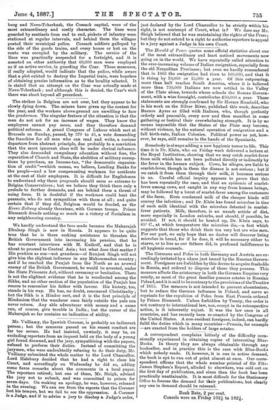The strikes in Belgium are not over, but they appear
to be slowly dying down. The. miners have given up the contest for the year, and the workers above-ground are unwilling to face the gendarmes. The singular feature of the situation is that the men do not ask for an increase of wages. They know the employers cannot pay more, and they therefore demand political reforms. A grand Congress of Labour which met at Brussels on Sunday, passed, by 379 to 45, a vote demanding the franchise for all men who can read and write, a curious departure from abstract principle, due probably to a conviction that the most ignorant class will be under clerical influence. They also demanded compulsory education without fees, the separation of Church and State, the abolition of military exemp- tions by purchase, an Income-tax, "the democratic organisa- tion of credit"—which means, we believe, Lending Banks for the people—and a law compensating workmen for accidents at the cost of their employers. It is difficult for Englishmen to understand why these proposals should seem so extreme to Belgian Conservatives ; but we believe they think them only a prelude to farther demands, and see behind them a threat of using force. It is doubtful if the workmen could heat the peasants, who do not sympathise with them at all ; and quite certain that if they did, Belgium would be flooded, as the %rem Zeitung already threatens, with German troops. Prince Bismarck dreads nothing so much as a victory of Socialism in any neighbouring country.


































 Previous page
Previous page